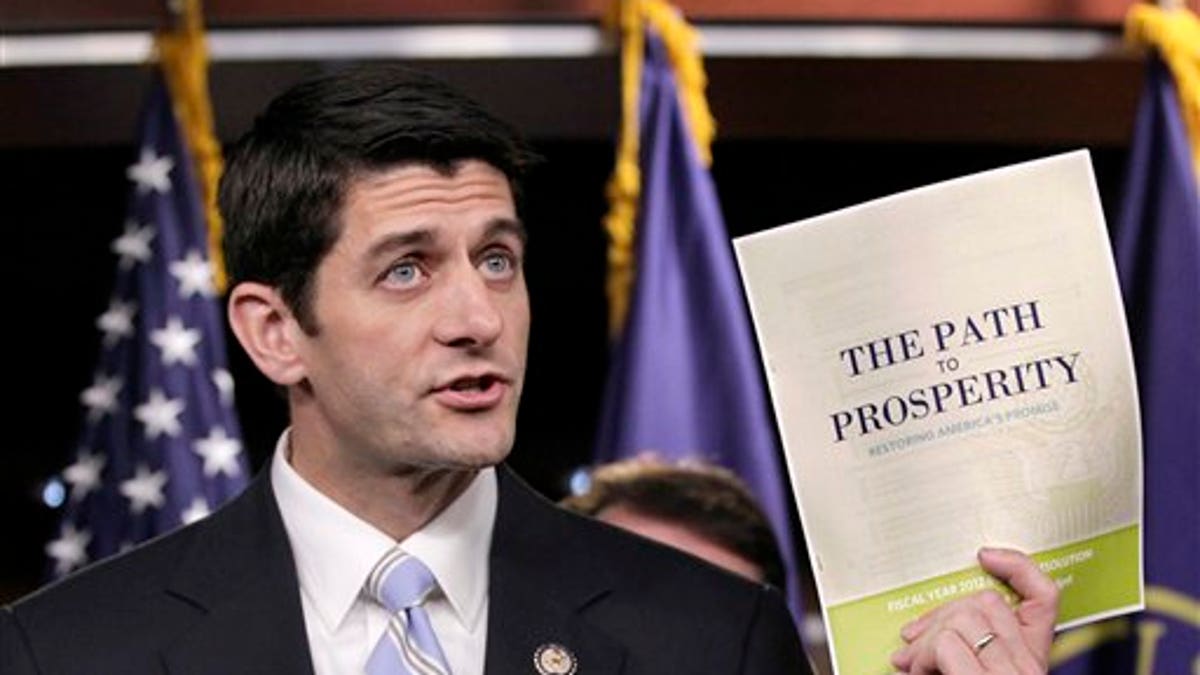
House Democrats attack the Ryan plan despite a pledge from President Obama to not demonize proposals. (AP)
WASHINGTON – House Republicans teed off an election-year fight with the White House and their Democratic colleagues Tuesday, unveiling a much-anticipated budget which Rep. Paul Ryan said would move America away from a "dependent culture."
Democrats immediately blasted the plan as unbalanced, and favoring corporations over Medicare recipients.
The plan reprises a controversial proposal first pitched last year which would overhaul Medicare for those currently under 55. The plan would let those beneficiaries choose from a list of plans, including the traditional fee-for-service Medicare plan as well as private plans which the government would subsidize.
"We believe competition and choices should be the way forward versus price controls that leads to rationing," Ryan, R-Wis., said at a press conference Tuesday.
The plan would also dramatically simplify the tax code, condensing the six-bracket system into two brackets for individuals -- one at 10, the other at 25 percent. Ryan doesn't say the income levels at which the new rates would apply, nor does he specify which popular tax breaks -- like the child tax credit or the mortgage interest deduction -- might be spared.
The GOP plan released by the House Budget Committee chairman would, if enacted into law, prescribe far less spending than President Obama's budget. It claims deficit cuts totaling $3.3 trillion -- spending cuts of $5.3 trillion tempered by $2 trillion in lower taxes -- below Obama's plan over the coming decade.
The deficit in 2015, for example, would drop to about $300 billion from $1.2 trillion for the current budget year.
But the plan has already hit resistance from the Democratic side, as it makes cuts to Medicaid, food stamps, Pell Grants and other Obama priorities.
"It's deja vu all over again," Rep. John Larson, D-Conn., chairman of the House Democratic Caucus, said Tuesday. He said the plan would make Medicare unrecognizable compared with its original form.
"The American people have already rejected this plan before -- and this year will be no different," said Minority Leader Nancy Pelosi, D-Calif. "The Republican proposal would end the Medicare guarantee, shift costs to seniors, and let Medicare wither on the vine while providing billions in tax breaks for Big Oil and special interests and destroying American jobs."
Republicans say the new approach on Medicare forces competition upon a wasteful health care system, lowering cost increases and giving senior more options. But opponents say the new system -- designed by Ryan and liberal Democratic Sen. Ron Wyden of Oregon -- cuts costs too steeply and would provide the elderly with a steadily shrinking menu of options and higher out-of-pocket costs.
Rep. Peter Roskam, R-Ill., chief deputy GOP whip, said the plan addresses a critical and looming crisis.
"This is the most predictable event in history -- that is a debt crisis of the United States, if we don't act," Roskam told Fox News.
The measure would, overall, cut spending from $3.6 trillion this year to the $3.5 trillion range in 2013 and freeze it at that level for two more years.
The GOP plan stands in sharp contrast to the budget released by Obama last month, which relied on tax increases on the wealthy but mostly left alone key benefit programs like Medicare.
The resulting political battle is sure to spill into the presidential race and contests for control of the House and Senate this fall. As if to underscore that reality, Ryan released a campaign-style video Monday evening telling viewers that "Americans have a choice to make" in a none-too-subtle appeal to voters.
"It's up to the people to demand from their government a better budget, a better plan, and a choice between two futures," Ryan said. "The question is: which future will we choose?"
The budget panel is slated to debate and vote on the measure Wednesday and in hopes of a vote by the full House next week.
The Senate has no plans to debate a budget and will instead rely on last summer's bipartisan budget and debt pact to guide this year's round of spending bills.
On Monday, two powerful Senate committee chairmen sent top House GOP leaders a letter protesting a GOP plan to cut agency operating budgets funded annually by Congress below levels negotiated just last summer. Instead of going with a $1.047 trillion cap on agency budgets as called for under last summer's debt and budget pact, the House panel is looking at cutting domestic agencies by $19 billion more.
Senate Budget Committee Chairman Kent Conrad, D-N.D., and Appropriations Committee Chairman Daniel Inouye, D-Hawaii, warned that breaking with the agreement only guarantees delays later this year and "represents a breach of faith that will make it more difficult to negotiate future agreements."
Also at issue, though, are across-the-board spending cuts set to take effect in January, punishment for the failure of last year's supercommittee to come up with a new package of $1.2 trillion in deficit cuts over the next decade as part of last summer's deal to let the government keep borrowing.
Those cuts, including $55 billion from defense accounts and $43 billion from non-defense accounts approved by lawmakers each year, are universally opposed by defense hawks and liberals alike.
The GOP plan would reverse the cuts by requiring various committees and try come up with at least $261 billion in other savings over the coming decade, including curbs to food stamps, federal employee pensions, and further cuts to federal health care programs. Republicans are likely to reprise a bid to tighten oversight of the child tax credit to make sure illegal immigrants don't claim it.
The measure would produce a $797 billion deficit in the upcoming 2013 fiscal year, as opposed to $977 billion under Obama's budget. The deficit would fall to $241 billion by 2016, compared to a $529 billion deficit in 2016 under Obama's plan.
The Associated Press contributed to this report.




